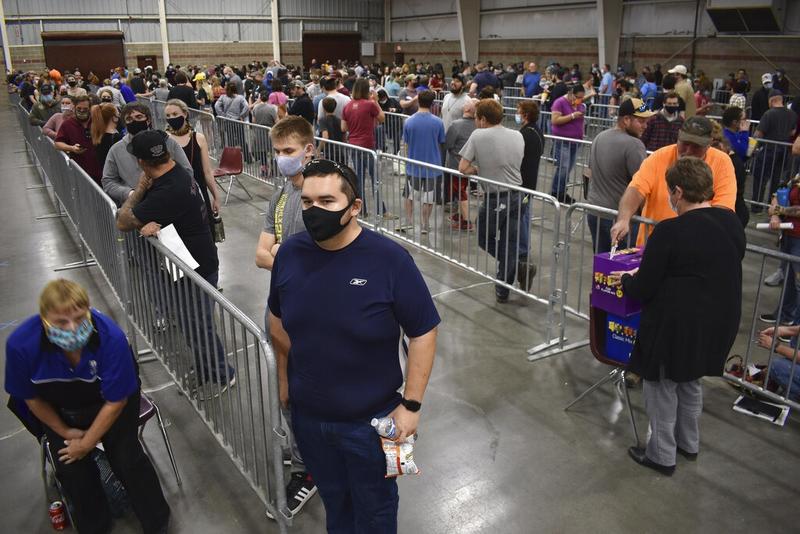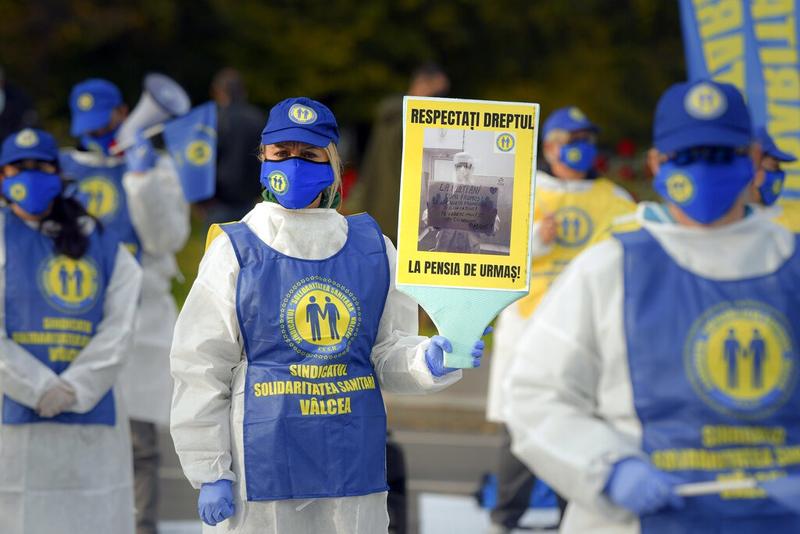
Minks are pictured in their cages at a fur farm on May 1, 2019 in Brumunddal, Norway. (PHOTO / AFP)
WASHINGTON / LONDON / BERLIN / PARIS / CARIO / SAN PAULO / MEXICO CITY - The World Health Organization is looking at biosecurity around mink farms in countries across the world to prevent further “spillover events” after Denmark ordered a national mink cull because of an outbreak of coronavirus infections in the animals.
Maria van Kerkhove, the WHO’s technical lead for COVID-19, told a briefing in Geneva on Friday that transmission of the virus between animals and humans was “a concern”.
But she added: “Mutations (in viruses) are normal. These type of changes in the virus are something we have been tracking since the beginning.”
The risk was much lower in other farm animals than mink, which appear to be much more susceptible to infection, a second WHO expert said.
“We are working with regional offices ... where there are mink farms, and looking at biosecurity and to prevent spillover events,” van Kerkhove said.
Denmark said this week it plans to cull its entire mink population and announced strict new lockdown measures in the north of the country to prevent a mutated coronavirus from spreading in the animals and to humans.
It has raised concerns that the mutations could affect the potential efficacy of COVID-19 vaccines in development.

People wearing protection masks ride bikes and electric scooter in Bucharest in Bucharest, Romania, Oct 22, 2020. (DANIEL MIHAILESCU / AFP)
Romania
Romania will impose a nationwide nighttime curfew and close all schools for 30 days from Monday after seeing the number of daily coronavirus infections double in two weeks, the government said on Friday.
Romania has some of the European Union's least developed healthcare infrastructure, and is witnessing one of the highest fatality rates in the bloc's eastern wing.
"Nationwide measures are required: all classes should move online; public and private employees should work remotely wherever possible; shops should be closed at 9 p.m., at the latest; nightly traffic should be restricted; private and public parties should be banned; fairs and markets should be closed," President Klaus Iohannis told a government meeting he presided over on Thursday.
Under the country's Constitution, the head of state may attend the government meetings where matters of national interest are discussed and shall preside over the meetings he participates in.
A record 9,714 infections were confirmed in the space of 24 hours, and about 1,000 patients are in intensive care, twice as many as a month ago. More than 7,500 people have died since the beginning of the outbreak in late February, in a country of 20 million people.
UK
Britain said it is removing Denmark from the government's travel corridor list, with people arriving in UK from there needing to self-isolate starting Friday after health authorities in Denmark reported widespread coronavirus outbreaks in mink farms.
"Passengers arriving into the UK from Denmark from 4am on Friday 6 November 2020 will need to self-isolate for 14 days by law before following domestic restrictions now in force," UK Transport Secretary Grant Shapps said in a statement.
British police said they arrested 104 Londoners on Thursday for breach of coronavirus regulations, adding that they expected more arrests as policing operations continued into the night.
People gathered in central London despite new restrictions that have been imposed to limit the spread of the coronavirus.
“Tonight, a crowd of people chose to ignore the new regulations, to behave irresponsibly and meet in a dangerous manner. More than 100 of these people have now been arrested and will have to face the consequences of their actions”, the Metropolitan Police said.
Prime Minister Boris Johnson on Saturday ordered England back into a national lockdown from Thursday morning after the United Kingdom passed the milestone of one million COVID-19 cases and a second wave of infections threatened to overwhelm the health service.
Foreign Secretary Dominic Raab is self-isolating after being in close contact with someone who has tested positive for COVID-19, the disease caused by novel coronavirus, local media reported Thursday.
Meanwhile, Germany and Sweden are being added to Britain's coronavirus quarantine list, which means travellers returning from both countries will have to isolate for two weeks, a senior British official announced Thursday.
Britain reported 24,141 new cases of COVID-19 on Thursday and 378 deaths from the virus, slightly down on figures from the day before, government data showed.
The cumulative toll for those who died within 28 days of a first positive COVID-19 test in the United Kingdom now stands at 48,120 while the number of people who have tested positive is 1,123,197 according to the data.
Britain's coronavirus reproduction number, also known as the R number, has remained unchanged at a maximum of 1.3, latest official figures revealed Friday.
The number remains between 1.1 and 1.3, the same as last week's figure, according to the government's Scientific Advisory Group for Emergencies.
US
US coronavirus cases increased by more than 100,000 -- the highest daily number ever recorded by any nation -- as Americans await the outcome of a presidential election that has exposed strongly opposing views on how aggressively to manage the pandemic.
Illinois, Ohio and Michigan were among states reporting record COVID-19 infections on Thursday, with Ohio’s governor calling the state’s numbers “shockingly high.” New York cases are running at the highest level in six months.
A recent surge in the Midwest has spread more widely, with states from New York to Utah reporting increasing cases. The nation has the most cases, at 9,586,656, and fatalities, 234,777, in the world.
With COVID -19 surging around the nation, an Associated Press analysis concluded that 93 percent of the 376 US counties with the biggest increases in per-capita cases voted for President Donald Trump. Most were in rural parts of the Midwest and Plains states, according to the analysis.
Global tally
Over 48.7 million cases have been recorded worldwide while the global death toll exceeded 1.23 million, according to the data from Johns Hopkins University.
 A medical worker grabs a hand of a patient to reposition the bed in the COVID-19 intensive care unit at a hospital in Houston, Texas, on Oct 31, 2020. (PHOTO / BLOOMBERG)
A medical worker grabs a hand of a patient to reposition the bed in the COVID-19 intensive care unit at a hospital in Houston, Texas, on Oct 31, 2020. (PHOTO / BLOOMBERG)
UN
The United Nations General Assembly (UNGA) on Thursday decided to hold on Dec 3-4 a special session on galvanizing international cooperation to deal with the COVID-19 pandemic.
"The special session of United Nations General Assembly on the coronavirus disease 2019 (COVID-19) pandemic is a historic moment, and a test, for multilateralism. It will be defined by our collective action on one of the most critical issues of our time," Volkan Bozkir, president of the 75th session of the UNGA, said in his remarks before the adoption of the Modalities Resolution for the 31st Special Session of the General Assembly on the COVID-19 Pandemic.
The resolution was adopted by 150 of the 193 UNGA member states. No country voted against the move, but the United States, Israel and Armenia abstained.
"It is vital that the special session provides an inclusive platform which has the capacity to hear from and address the concerns of member states and other stakeholders, including civil society, academia, and private sector experts pioneering the development of vaccines. To this end, the second day will feature interactive multistakeholder dialogue panels on different aspects of COVID-19," said Bozkir.
READ MORE: Greece orders nationwide lockdown to curb virus surge
Russia
Russia reported 20,582 new coronavirus infections in the last day, with two-thirds of them outside of Moscow, according to the government’s virus response center.
The disease’s spread in regions beyond Moscow and St. Petersburg has highlighted the problems plaguing Russia’s underfunded health-care system, with many areas struggling to handle the influx of sick people. At least 16 regions face a critical lack of beds.
Belgium
Belgium reported an average 13,213 daily cases in the past 7 days, a 16% decline that is strongly correlated to a 15% drop in the number of tests performed in the previous 7-day period.
There are now a record 1,428 COVID -19 patients in intensive care, an increase of 16 from the day before. Hospital admissions fell to 556 from 653 the day before, the lowest figure since Nov. 1.
Czech Republic
The Czech Republic reported 13,231 new coronavirus cases for Nov. 5, bringing the total tally in the country since the pandemic started to 391,945, Health Ministry data showed on Friday.
The ministry also recorded 197 new deaths, including 97 on Thursday along with revisions from previous days. The country is showing the most deaths per capita in Europe in the past two weeks and one of the continent's highest infection rates.
In total, 4,330 people have died in relation to COVID-19 in the country of 10.7 million.
Ukraine
Ukraine registered a record 201 new COVID-19 related deaths in the past 24 hours, the health minister said on Friday, up from a high of 199 reported on November 4.
Maksym Stepanov also said 9,721 new COVID-19 cases had been registered. Total infections stood at 440,188 with 8,125 deaths by Friday, he said.
France
France posted a record number of new virus cases, 58,046, as the health minister warned of a “violent” second wave sweeping the country.
France is also facing a surge in intensive care patients, Health Minister Olivier Veran said. Virus patients now account for more than 85% of French hospitals’ initial intensive-care capacity. Another 363 people died from the virus, bringing the total to 39,037.
 In this Nov 3, 2020 photo, voters wait in line to cast their ballots inside the MetraPark event center in Billings, Mont. (PHOTO / AP)
In this Nov 3, 2020 photo, voters wait in line to cast their ballots inside the MetraPark event center in Billings, Mont. (PHOTO / AP)
Germany
Germany recorded 22,561 new coronavirus cases in the 24 hours through Friday morning, down from the previous day’s record of 31,480, according to data from Johns Hopkins University.
The figures have fluctuated significantly in recent weeks, with daily infections falling to the lowest in almost two weeks on Wednesday. The average over the past seven days has risen to 17,827 from 14,644 over the previous period.
A partial lockdown took effect Monday designed to reduce social contact while keeping Europe’s biggest economy running. The restrictions include closing bars and restaurants while keeping schools and daycare centers open.
Italy
Italy reported a record daily 34,505 cases a few hours before latest restrictions, including a night-time curfew from 10 p.m., become effective. Daily fatalities rose to 445, the highest since early May, according to the health ministry.
Italy targeted the financial capital of Milan and key industrial hubs in the north with a set of tough new restrictions, including restricting people to the cities and towns where they live starting Friday. Bars, restaurants and shops will be closed except for food, pharmacies and other essential businesses in the highest-risk areas. Citizens are asked not to use any private or public transportation if not for health or business reasons.
Greece
Greece has registered 2,917 COVID-19 cases in a 24-hour span, a new single-day record, the National Public Health Organization said on Thursday.
The country also reported 29 more deaths during the period, bringing the death toll to 702, with the victims' average age at 79, according to the health organization.
Sweden
Swedish Prime Minister Stefan Lofven has quarantined himself after one of his close contacts was exposed to someone who had tested positive for the coronavirus.
In a Facebook post on Thursday, the prime minister said that his contact had tested negative and that he himself was feeling well.
"We have no symptoms," Lofven wrote of himself and his wife, adding that "in accordance with recommendations, we will take a corona[virus] test as soon as possible."
The prime minister plans to work remotely while he and his wife stay at home "for the time being." He also urged Swedes to take the Public Health Agency's recommendations seriously and to stay at home at the slightest sign of a flu.
The prime minister's decision to go into quarantine comes at a time when Sweden is experiencing a growing infection rate, with several regions introducing stricter social-distancing recommendations and restrictions.
Swedish Public Health Agency reported 4,034 new infections and five new deaths from the coronavirus since Wednesday. To date, the country has registered 141,764 confirmed cases.
Slovenia
The government of Slovenia on Thursday decided to extend again key restrictive measures designed to curb the spread of coronavirus.
The ban on movement between municipalities and the six-person ceiling for gatherings have been extended for another week, while more services and businesses have been allowed to reopen from Friday.
This is the second time that the government has extended lockdown restrictions since imposing the highest level of restrictive measures on Oct. 24.
The government also amended the coronavirus status of several countries as a result of which the whole of Croatia, Austria ,Hungary, Serbia and almost entire Italy are moved to the red list.
Slovenia on Thursday reported 1,685 new COVID-19 cases in the past 24 hours, taking the national tally to 41,025, as hospitalizations and fatalities reached a new high.
ALSO READ: Dutch govt: 2nd case of mink transmitting virus to human
Hungary
Hungary will try to avoid closing schools as long as possible but some medical operations will have to be rescheduled as hospital beds are filling up with coronavirus patients, Prime Minister Viktor Orban said on Friday.
Based on current predictions, Orban said, Hungary will need 2,240 intensive beds with ventilators for patients by Nov. 21, and 4,480 intensive beds by Dec. 10.
Hungary reported on Friday a record daily rise of 4,709 new COVID-19 infections, with 5,489 patients being treated in hospital, the government said.
The death toll rose by 103, the first time it has exceeded 100 in one day, taking the total number of fatalities so far in the country of 10 million people to 2,250.
 Member of medical staff hold banners, one reading "Respect the right to a survivors' pension" during a protest outside the government headquarters, demanding better protective equipment against the COVID-19 infection and the increasing of staff numbers in the state medical services in Bucharest, Romania, Nov 5, 2020. (PHOTO / AP)
Member of medical staff hold banners, one reading "Respect the right to a survivors' pension" during a protest outside the government headquarters, demanding better protective equipment against the COVID-19 infection and the increasing of staff numbers in the state medical services in Bucharest, Romania, Nov 5, 2020. (PHOTO / AP)
Cyprus
Cyprus' Health Ministry announced a record number of COVID-19 infections on Thursday, saying in a statement that 233 people have tested positive.
The results from 3,756 tests were announced as new stricter restrictions were rolled out in a bid to stem a second wave of the disease. To date, the country has a total of 5,333 cases.
Canada
The Public Health Agency of Canada (PHAC) said on Thursday that COVID-19 can be transmitted through small airborne droplets.
PHAC updated its virus transmission guidance on Tuesday, bringing them in line with the advice of the World Health Organization (WHO).
"SARS-CoV-2, the virus that causes COVID-19, spreads from an infected person to others through respiratory droplets and aerosols created when an infected person coughs, sneezes, sings, shouts, or talks," the updated guidance said.
"The droplets vary in size from large droplets that fall to the ground rapidly (within seconds or minutes) near the infected person, to smaller droplets, sometimes called aerosols, which linger in the air under some circumstances," it said.
"Infectious droplets or aerosols may come into direct contact with the mucous membranes of another person's nose, mouth or eyes, or they may be inhaled into their nose, mouth, airways and lungs," it said.
Mexico
Mexico's health ministry reported on Thursday 5,567 additional coronavirus cases and 544 more deaths, bringing the official number of cases to 949,197 and the death toll to 93,772.
Health officials have said the real number of infected people is likely significantly higher than the confirmed cases.
Brazil
Brazil reported 22,294 additional confirmed cases of the novel coronavirus in the past 24 hours, and 630 deaths from COVID-19, the health ministry said on Thursday.
The South American country has now registered 5,612,319 cases since the pandemic began, while the official death toll has risen to 161,736, according to ministry data, in the world's most fatal outbreak outside the United States.
 A participant in 'The Million Mask March', an annual event described as a march "against austerity, the infringement of rights, war crimes, corrupt politicians and to reinstate liberty", gathers in central London, Nov 5, 2020. (PHOTO / AP)
A participant in 'The Million Mask March', an annual event described as a march "against austerity, the infringement of rights, war crimes, corrupt politicians and to reinstate liberty", gathers in central London, Nov 5, 2020. (PHOTO / AP)
Colombia
Colombia's lower house abruptly ended its session on Thursday and asked lawmakers to quarantine after a member tested positive for coronavirus.
Lawmakers in Colombia, which has registered more than 1.1 million confirmed coronavirus cases and more than 32,000 deaths, have the option to connect virtually or attend sessions in person.
At least 150 lawmakers could potentially have been exposed, the chamber's press office said.
Representatives should avoid travel to their home regions and remain in Bogota while they wait 72 hours from potential exposure to have a test, said the president of the chamber, Conservative representative German Blanco.
Libya
The United Nations Children's Fund (UNICEF) and the World Health Organization (WHO) on Thursday expressed concern over severe shortage of vaccines for children in Libya.
"UNICEF and WHO are extremely concerned over severe shortages of critical vaccines in Libya that threaten the health of children. Over the past seven months, unprecedented vaccine shortages in the country have put them at risk of disease and death," said a joint statement.
The decline in the number of children receiving life-saving vaccines in Libya is a direct result of the COVID-19 pandemic, which has led to the closure of international borders, restrictions on movement, and delay in procuring and distributing vaccines, the statement explained.
UNICEF and WHO urged the national authorities to secure the immediate release of funds to replenish the country's vaccine supply.
The National Center for Disease Control of Libya on Thursday reported 853 new COVID-19 cases, taking the nationwide count to 65,440 with 38,110 recoveries and 910 deaths.
Algeria
Algerian Health Minister Abderrahmane Benbouzid said on Thursday that his country was determined to acquire the vaccine against COVID-19 regardless of its price.
Benbouzid made the remarks at a press conference in the Algerian capital Algiers, the official APS news agency reported.
The minister added that Algeria has joined the COVAX group with other countries to guarantee the protection of its citizens through use of the vaccine against COVID-19.
He said that "as soon as it is marketed, Algeria will acquire the vaccine to protect its citizens, whatever the cost."
At the same time, Benbouzid admitted that Algeria is facing a second wave of the pandemic, which is more fierce and dangerous than the first.
Morocco
Morocco registered 5,641 new COVID-19 cases on Thursday, taking the total tally in the North African country to 240,951, the health ministry said in a statement.
It also reported 77 new deaths from the coronavirus, raising the death toll in Morocco to 4,059.
The number of recoveries in Morocco increased by 3,329 to 197,215 in the last 24 hours, while 874 patients remained in the intensive care units.
Casablanca is still the worst-hit region in the country with 2,517 newly confirmed cases and 31 deaths during the last 24 hours.
Meanwhile, Morocco on Thursday extended the state of health emergency across the county until Dec. 10, as part of efforts aimed at curbing the spread of the COVID-19 pandemic.
Aspirin
Painkiller aspirin will be evaluated as a possible treatment for COVID-19 in one of Britain’s biggest trials, which will assess whether it might reduce the risk of blood clots in people with the disease.
The scientists behind the RECOVERY trial, which is looking into a range of potential treatments for COVID-19, said it would include the drug, which is commonly used as a blood thinner.
“There is a clear rationale for believing that it (aspirin) might be beneficial, and it is safe, inexpensive and widely available,” said Peter Horby, co-chief investigator of the trial.
Patients infected with the coronavirus are at a higher risk of blood clots because of hyper-reactive platelets, the cell fragments that help stop bleeding. Aspirin is an antiplatelet agent and can reduce the risk of clots, the RECOVERY trial’s website said on Friday.
At least 2,000 patients are expected to randomly get 150 mg of aspirin daily along with the usual regimen. Data from those patients will be compared with at least 2,000 other patients who receive the standard COVID-19 treatment on its own, the website showed.
Small daily doses of aspirin has been found to reduce the risk of certain cancers. As a blood thinner, it increases the risk of internal bleeding, and taking too much over a long period of time has been associated with kidney damage.
Other treatments being tested in the RECOVERY trial include common antibiotic azithromycin and Regeneron’s antibody cocktail that was used to treat US President Donald Trump’s COVID-19 symptoms.
Austria
Austria warned on Friday that all its COVID-19 intensive care beds could be full within two weeks because of the “much stronger, more serious” second wave of coronavirus infections.
There was a sharp drop to 6,464 new infections within 24 hours from a record 7,416 the day before, but Health Minister Rudolf Anschober said the number was still alarming.
“The second wave is much stronger, more serious, more dynamic and more powerful,” he told a news conference.
Forty-one people died in the latest reporting period, and 421 were in intensive care.
Since Tuesday, a nighttime curfew has been in force and cafes, bars and restaurants are closed to all but take-away service. Factories, shops, kindergartens and primary schools remain open, while secondary schools and universities have switched to distance learning.
The director general of the National Public Health Institute, Herwig Ostermann, said his projections indicated that, even with these measures in place, 750 of Austria’s 800 intensive care beds reserved for COVID-19 patients were likely to be filled by Nov. 18.
Tracing the source of a coronavirus infection has become harder and is being achieved in only 27 percent of cases, said Daniela Schmid, chief epidemiologist at Austria’s Agency for Health and Food Safety (AGES).
The average age of those infected is currently 43, she said.


